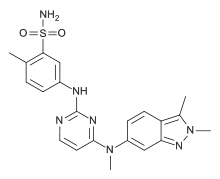All AbMole products are for research use only, cannot be used for human consumption.

Pazopanib is an oral angiogenesis inhibitor of tyrosine kinases, targeting vascular endothelial growth factor receptor, platelet-derived growth factor receptor, and c-Kit. Two clinical trials met the inclusion criteria for the use of pazopanib in RCC (a Phase II and a Phase III trial). Pazopanib is an inhibitor of numerous tyrosine kinases, including vascular endothelial growth factor receptor and platelet-derived growth factor receptors. It is involved in inhibiting signaling pathways, angiogenesis, and cell proliferation. A 2-fold increase in AUC was seen when pazopanib was administered with a high-fat meal as well as when crushing the tablet. Thus, pazopanib should be administered on an empty stomach at least 1 hour before or 2 hours after a meal. Pazopanib is primarily metabolized by cytochrome P-450 3A4, and caution should be used with concomitant administration of cytochrome P-450 inducers and/or inhibitors. In a Phase III trial of pazopanib in metastatic RCC, pazopanib reportedly improved progression-free survival from a median of 4.2 to 9.2 months compared with placebo (P < 0.0001). The most common adverse effects of pazopanib were hypertension, hair depigmentation, diarrhea, nausea, anorexia, and vomiting. Many of the grade 3/4 toxicities were hepatic in nature, with elevations occurring in aspartate aminotransferase, alanine aminotransferase, and bilirubin. Pazopanib is reportedly effective in the treatment of metastatic RCC. Although there are currently no direct comparisons between pazopanib and other tyrosine kinase inhibitors, the data suggest that pazopanib may be a first-line option in the treatment of RCC. The only Phase III trial of pazopanib suggests improvement of progression-free survival in RCC as well as tolerability in the selected population.
| Cell Experiment | |
|---|---|
| Cell lines | MM.1S, MM.1R, RPMI-Dox40 (Dox40), and OPM2 cells |
| Preparation method | Cell Proliferation Assay Cell growth was assessed by measuring [3H]thymidine uptake as described. |
| Concentrations | 0~10 μg/ml |
| Incubation time | 48 h |
| Animal Experiment | |
|---|---|
| Animal models | MM.1S MM cells tumor xenograft mouse model in Beige-nude Xid mice |
| Formulation | 0.5% hydroxypropylmethyl cellulose (Sigma-Aldrich, St. Louis, MO) and 0.1% Tween-80 (Sigma-Aldrich) in water |
| Dosages | 30 and 100mg/kg daily |
| Administration | oral gavage |
| Molecular Weight | 437.52 |
| Formula | C21H23N7O2S |
| CAS Number | 444731-52-6 |
| Solubility (25°C) | DMSO 62 mg/mL |
| Storage |
Powder -20°C 3 years ; 4°C 2 years In solvent -80°C 6 months ; -20°C 1 month |
| Related VEGFR/PDGFR Products |
|---|
| SU5208
SU5208 inhibits vascular endothelial growth factor receptor-2 (VEGFR2). |
| VEGFR-IN-1
VEGFR-IN-1 is a potent angiogenesis inhibitor with IC50s of 0.02, 0.18, 0.24 7.3, and 7 µM for KDR, Flt-1, c-Kit, EGF-R, and c-Src, respectively. |
| (Z)-Orantinib
(Z)-Orantinib ((Z)-SU6668) is a potent, selective, orally active and ATP competitive inhibitor of Flk‐1/KDR, PDGFRβ, and FGFR1, with IC50s of 2.1, 0.008, and 1.2 µM, respectively. |
| (Rac)-SAR131675
(Rac)-SAR131675 is the racemate of SAR131675. |
| AGL 2043
AGL 2043 is an effective inhibitor of PDGFR (IC50=0.8 μM) and TEL-PDGFR kinases, as well as FLT3 and KIT kinases. |
All AbMole products are for research use only, cannot be used for human consumption or veterinary use. We do not provide products or services to individuals. Please comply with the intended use and do not use AbMole products for any other purpose.


Products are for research use only. Not for human use. We do not sell to patients.
© Copyright 2010-2024 AbMole BioScience. All Rights Reserved.
